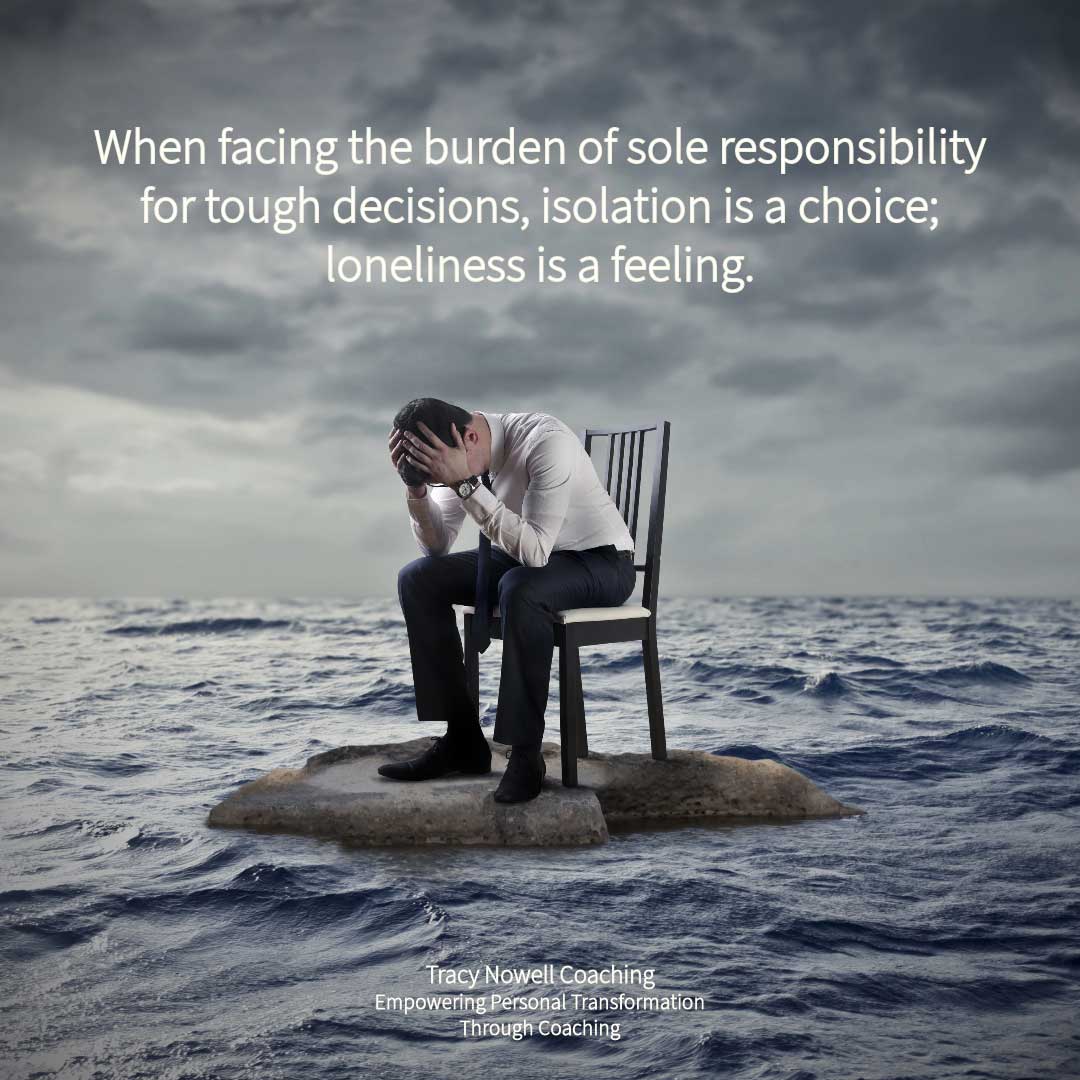The Burden of Tough Decisions

Have you ever felt isolated and alone when faced with sole responsibility for making tough decisions?
As a leader at work, in the community or the family, responsibility and accountability for making tough decisions is part of the job description.
And even though most would think this goes without saying, we are also responsible for leading and being accountable for ourselves, although some fail to do so.
Generally speaking, I think there would be agreement that most of our day-to-day decisions are made with little difficulty.
However, the situation can change in a heartbeat when facing vitally important decisions that can make or break a company, organization, group, team, family or person. Pressure and stress can increase exponentially, whether it mounts over time or appears in a sudden burst. It can feel like the weight of the world is on your shoulders. The greater the perceived risk or importance, the higher the intensity of pressure and stress.
The voices of those your decision affects or the opinions of others you listen to can sway your thinking like a wave blown and tossed by the wind. Even those recognized as steady, confident and assertive decision-makers can sometimes become unsure or reluctant when vacillating between choices or when the path is uncertain and fraught with peril.
Or maybe those voices are a unison expression of your own thinking, like an echo chamber. It may be difficult to assess if their agreement is thought-driven approval or merely the thoughtless endorsement of "yes" people.
Others may offer their tacit approval, but doubt may seep into your thinking due to the lack of open expression.
There may also be loud, competing voices that yearn for title and authority, maybe even your job. Their swagger and desire to demonstrate decisiveness fuels a push to accept their chosen path, even if it is ill-advised and ill-informed.
The result?
A normally confident and assertive person morphs into one who is confused, contorted, and hesitant, feeling pressed, anxious and stressed while questioning their abilities and belief in themselves.
Some may mask their confusion due to a concern that others would perceive any display of indecisiveness as a weakness.
Aloneness increases with the mounting pressure and stress. It feels as though you are stranded in a place where no one can help while, at the same time, assuming a "game face" of confidence and control. Avoidance of or reduced interaction with others then leads to a state of mental or physical separation.
If this situation sounds familiar, please consider the validity of the following statement.
When facing the burden of sole responsibility for tough decisions, isolation is a choice; loneliness is a feeling.
I acknowledge there are most likely exceptions to this thought. However, from what I have experienced and observed, people who "feel" isolated have knowingly or unknowingly chosen isolation. Often, it is due to an aversion to seeking the help of others, fear of embarrassment or failure, too many unhelpful voices, a lack of experience, a flawed decision-making process or a limited mental capacity due to stress and fatigue, to name a few.
So, if isolation is not working, what might you choose to do differently?
Here are a few thoughts -
Choose to refocus and reframe - pivot and shift from debilitating feelings to a rational, reasoned thought process, from a problem-focused approach that most likely exacerbates the situation to a solution-focused approach that envisions possibilities. The real problem might be the decision process itself, not the inability to make a tough decision. For many, this may be difficult to do on your own – the more stuck in isolation, the more difficult it becomes to change perspective.
Choose to seek wise counsel - as Proverbs 15:22 (NIV) says, "Plans fail for lack of counsel, but with many advisors they succeed."
Such advisors might include -
➢ Soliciting the thoughts of others involved – seeking input, opinions or
counsel from key and informed individuals with a vested interest in the
outcome.
➢ Engaging outside help - from a trusted person outside the realm of those
impacted by your decision with the proven character and ability to act as an
advisor or mentor, maybe someone who has "walked in your shoes" before.
Choose to hire a coach - At some point, you have enough people tell you, advise you on what to do, or share their experience. But what if you still ruminate over your decision in a vacuum?
In this situation, you would most likely benefit from someone who could ask the right questions, the hard questions others may be reluctant to ask to challenge your perspective and the perspectives heard from others.
Coaches can serve as a "thought" partner or sounding board, an independent, confidential and unbiased source to support and challenge your decision process, your perspective and those of others. Coaches are skilled at asking incisive questions, empowering reflective thinking and challenging thoughts to help you see the big picture, overcome emotions, identify blind spots or source missing information or input.
Coaching may be your best choice because it increases the probability of unleashing new creativity, ideation and unencumbered mental processing while discarding unnecessary and unhelpful processes or filtering input that leads to confusion or mental paralysis.
The choice is yours. As opposed to how you may feel or what you assume others might think of you, seeking helpful input, wise counsel, or coaching demonstrates intelligence, strength of character and humility instead of remaining stuck and isolated due to emotions, timidity or pride (ego).
"The way of fools seems right to them, but the wise listen to advice."
Proverbs 12:15 (NIV)